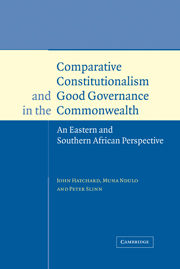 Comparative Constitutionalism and Good Governance in the Commonwealth
Comparative Constitutionalism and Good Governance in the Commonwealth Book contents
- Frontmatter
- Contents
- Preface
- List of cases
- List of constitutions
- List of statutes
- List of other instruments
- Map
- Introduction
- 1 The democratic state in Africa: setting the scene
- 2 Constitutions and the search for a viable political order
- 3 Devising popular and durable national constitutions: the new constitutions of the 1990s
- 4 Perfecting imperfections: amending a constitution
- 5 Presidentialism and restraints upon executive power
- 6 Enhancing access to the political system
- 7 Making legislatures effective
- 8 The judiciary and the protection of constitutional rights
- 9 The devolution of power to local communities
- 10 Developing autochthonous oversight bodies: human rights commissions and offices of the ombudsman
- 11 Seeking constitutional control of the military
- 12 Constitutionalism and emergency powers
- 13 Constitutional governance: the lessons from southern and eastern experience
- Bibliography
- Index
13 - Constitutional governance: the lessons from southern and eastern experience
Published online by Cambridge University Press: 23 June 2009
- Frontmatter
- Contents
- Preface
- List of cases
- List of constitutions
- List of statutes
- List of other instruments
- Map
- Introduction
- 1 The democratic state in Africa: setting the scene
- 2 Constitutions and the search for a viable political order
- 3 Devising popular and durable national constitutions: the new constitutions of the 1990s
- 4 Perfecting imperfections: amending a constitution
- 5 Presidentialism and restraints upon executive power
- 6 Enhancing access to the political system
- 7 Making legislatures effective
- 8 The judiciary and the protection of constitutional rights
- 9 The devolution of power to local communities
- 10 Developing autochthonous oversight bodies: human rights commissions and offices of the ombudsman
- 11 Seeking constitutional control of the military
- 12 Constitutionalism and emergency powers
- 13 Constitutional governance: the lessons from southern and eastern experience
- Bibliography
- Index
Summary
In our opening chapter, we quoted the words of the Harare Commonwealth Declaration, enjoining the practice of good governance and democracy upon the members of the Commonwealth, eleven of which fall into our eastern and southern African grouping. What lessons can be learned from the study undertaken in this book of the elements of constitutional governance in this regional setting? Underlying this study is the notion that good government in a democratic context is an essential prerequisite of development. This now appears to have acquired the status of received wisdom, although, as Patrick Chabal reminds us, the lesson of East Asia is that democracy is the outcome of, and not the precondition for, economic development.
Constitutions do matter: the problem of constitutionalism
R. H. Green's remark that ‘many African constitutions are simply irrelevant’ reflects in a stark fashion the hardly controversial proposition that merely studying the constitutional texts may tell us very little about the realities of the political order which governs the daily life of citizens. Writing nearly forty years ago, Stanley de Smith, one of the founding fathers of Commonwealth constitutional scholarship conceded that:
… [i]n developing countries constitutional factors will seldom play a dominant role in the shaping of political history. When choosing a particular method of enacting political practice one is merely adopting a tentative assumption that this method will provide the soundest basis for stable, democratic government.
- Type
- Chapter
- Information
- Comparative Constitutionalism and Good Governance in the CommonwealthAn Eastern and Southern African Perspective, pp. 308 - 324Publisher: Cambridge University PressPrint publication year: 2004
